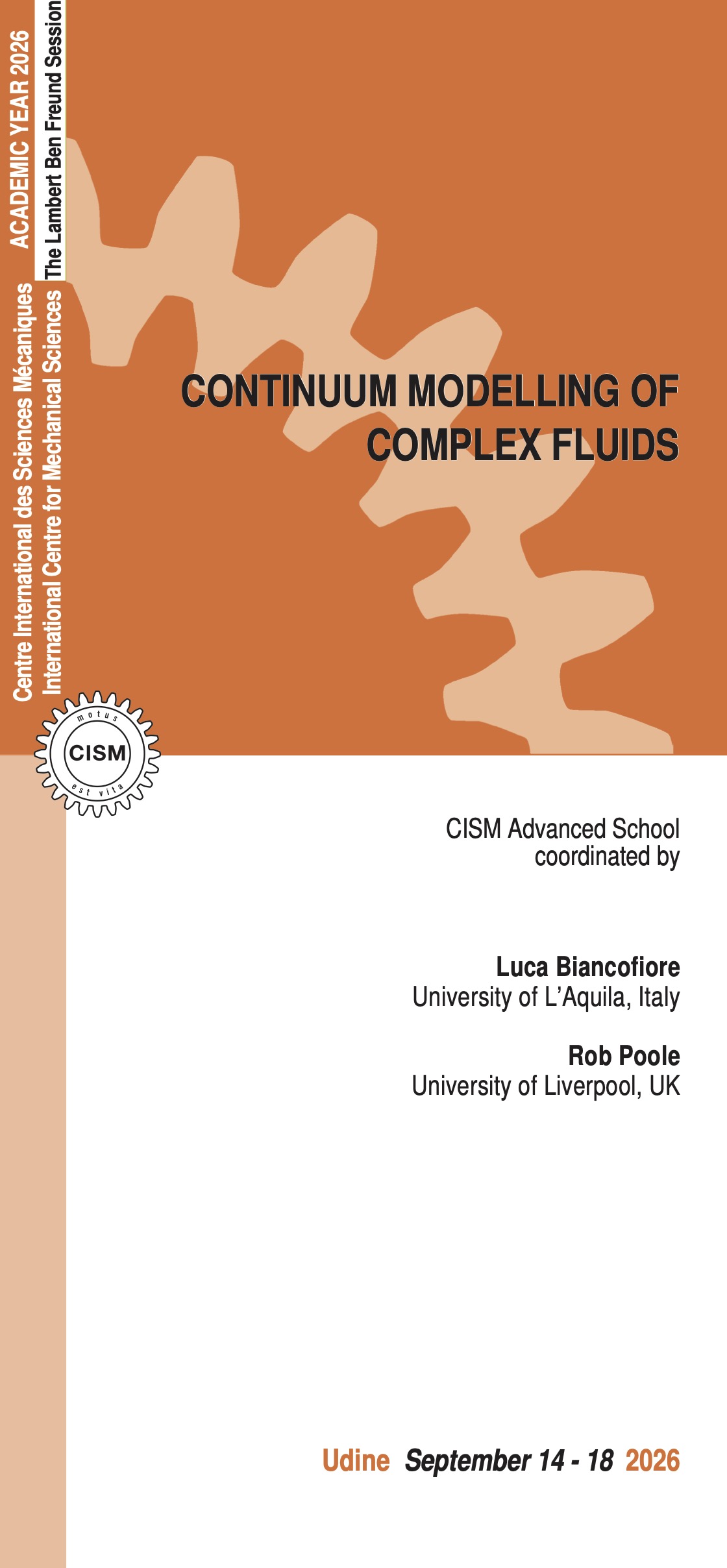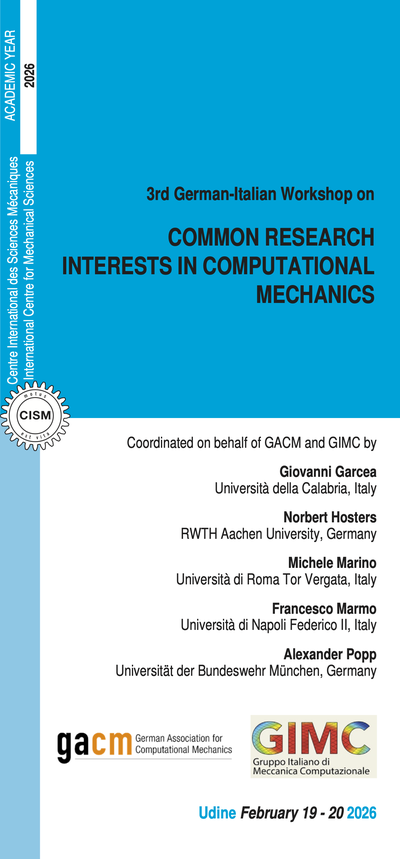Complex fluids - such as polymer solutions, colloidal suspensions, worm-like micelles, and gels - are ubiquitous in industrial, biological, and environmental systems. Their behaviour often deviates from Newtonian fluids due to their intricate microstructure, exhibiting viscoelasticity, yield stress, shear thinning/thickening, and thixotropy. Understanding and predicting their flow dynamics requires advanced theoretical and numerical tools that extend beyond the scope of classical fluid mechanics.
This course aims to provide a comprehensive introduction to the continuum modelling of complex fluids, bridging the gap between theoretical foundations and practical applications. It is designed for doctoral students, postdoctoral researchers, and early-career scientists in engineering, physics, and applied mathematics with a solid background in fluid mechanics or rheology.
Participants will be introduced to the principles underpinning the rheology of non-Newtonian materials, the derivation and application of constitutive models, and modern analytical and computational tools for predicting their flow behaviour. The course will combine fundamental theory with practical examples drawn from research and industry, highlighting the relevance of continuum models in solving real-world problems.
The course offers:
• A solid foundation in the modelling and numerical simulation of non-Newtonian fluids.
• Key concepts such as lubrication theory, linear and nonlinear stability analysis, and advanced constitutive modelling (e.g. viscoelastic, viscoplastic, and elastoviscoplastic models).
• Insight into experimental correlations, model validation, and the challenges of parameter estimation in complex rheological systems.
• Exposure to state-of-the-art research and applications in both academic and industrial contexts.
Course Format
The school begins with four shared introductory lectures to establish a common background. These lectures are essential to ensure that all participants, who are expected to come from a wide range of scientific and engineering disciplines, start from a shared baseline of knowledge. The sessions will review key principles of fluid mechanics and rheology and introduce the basic ideas of continuum modelling before moving on to specialised topics.
This is followed by thematic lectures from six international experts, each focusing on a specific research area. Topics include generalised Newtonian fluids, viscoelastic and yield-stress models, constitutive parameter estimation, stability theory, finite element modelling, and flow classification methods.
Participants will also engage in:
• A flash poster presentation (Day 1 afternoon) for a brief introduction to participants’ research topics.
• A poster session following the flash presentations, promoting informal discussion and collaboration.
• Daily interactions and collaborative learning sessions.
Target Audience
• Doctoral students and young researchers starting in the field of complex fluids.
• Experimentalists aiming to strengthen their theoretical and modelling expertise.
• Engineers, applied physicists, and mathematicians with a strong technical background.
• Industrial practitioners interested in modern modelling approaches for non-Newtonian materials.
The course will equip participants with the conceptual and computational tools needed to critically assess, apply, and extend existing models for complex fluids, enhancing their ability to tackle research and engineering challenges in the field.
Bird, R.B., Armstrong, R.C., Hassager, O. Dynamics of Polymeric Liquids, Vols. 1 and 2, Wiley-Interscience (1987).
Larson, R.G. Constitutive Equations for Polymer Melts and Solutions, Butterworth-Heinemann (1988).
Owens, R.G., and Phillips, T.N. Computational Rheology, Imperial College Press (2002).
Tanner, R.I. Engineering Rheology, Oxford University Press (2000).
Macosko, C.W. Rheology: Principles, Measurements, and Applications, Wiley-VCH (1994).
Balmforth, N.J., Frigaard, I.A., and Ovarlez, G. “Yielding to stress: Recent developments in viscoplastic fluid mechanics.” Annual Review of Fluid Mechanics 46, 121–146 (2014). https://doi.org/10.1146/annurev-fluid-010313-141424
Castillo Sánchez, H.A., Jovanovic, M.R., Kumar, S., Morozov, A., Shankar, V., Subramanian, G., & Wilson, H.J. “Understanding viscoelastic flow instabilities: Oldroyd-B and beyond.” Journal of Non-Newtonian Fluid Mechanics 302, 104742 (2022). https://doi.org/10.1016/j.jnnfm.2022.10474
4 lectures on:
Lubrication equations for non-Newtonian fluids and their simplifications for thin film flows. Applications include lubricated contacts, coating flows, and droplet dynamics, with an emphasis on asymptotic modelling and scaling arguments.
5 lectures on:
Multimode constitutive equations for non-Newtonian fluids and quantitative estimation of parameters from rheological data. Emphasis will be on steady and transient rheology, model fitting strategies, and illustrative examples from polymer and micellar systems.
5 lectures on:
Modelling using yield-stress fluids, including solvable thin-film flows and variational formulations. The lectures will discuss applications to industrial processes and introduce energy-based stability methods for viscoplastic systems.
4 lectures on:
Generalised Newtonian Fluid and viscoelastic models, scaling laws, and flow classification metrics. The lectures will provide physical intuition and practical guidelines for selecting and non-dimensionalising constitutive models.
5 lectures on:
Modelling and predicting flows of elastoviscoplastic materials using finite element or finite volume methods. Examples will include buoyancy-driven drop or bubble flow and interaction using surface tracking methods and flows in benchmark geometries using OpenFoam. Discussion will include constitutive frameworks combining elasticity, viscosity, and yield stress, and their validation against rheometric experimental data.
5 lectures on:
Linear and nonlinear stability in complex fluids, focusing primarily on elastic instabilities. The lectures will cover the fundamental theory of linear stability, analytical and numerical approaches to solving stability problems and an overview of recent advances in both linear and nonlinear regimes.
Introductory Lectures:
The lecturers will jointly deliver four general introductory lectures on Day 1. Topic: Foundations of complex fluids: types, behaviours, constitutive equations, and motivations for continuum modelling. These lectures will ensure that all participants start from a common baseline. Since attendees are expected to come from diverse backgrounds-such as applied mathematics, physics, engineering, and experimental rheology-the sessions will review key concepts in fluid mechanics and rheology to provide a shared foundation for the specialised topics that follow.
ADMISSION AND ACCOMMODATION
The course is offered in a hybrid format, allowing participants the flexibility to attend either in person or remotely via the Microsoft Teams platform. Admission to on-site attendance is granted on a first-come, first-served basis to comply with the capacity of the lecture room.
Registration fees:
- Early Bird On-Site Participation: € 650.00 + VAT* - Deadline: July 14, 2026
- Late On-Site Participation: € 800.00 + VAT* - Deadline: September 2, 2026
- Live Streaming Online Participation: € 250.00 + VAT* - Deadline: September 2, 2026
On-site participation includes a complimentary bag, five fixed menu buffet lunches, hot beverages, downloadable lecture notes.
Online participation includes downloadable lecture notes.
Application forms should be submitted online through the website: http://www.cism.it. A confirmation message will be sent to participants whose applications are accepted.
Upon request, and subject to availability, a limited number of on-site participants can be accommodated at the CISM Guest House for € 35 per person per night. To request accommodation, please contact foresteria@cism.it.
CANCELLATION POLICY
Applicants may cancel their registration and receive a full refund by notifying the CISM Secretariat in writing (via email) no later than:
- July 14, 2026, for early bird on-site participation;
- August 14, 2026, for late on-site participation;
- September 2, 2026, for online participation.
No refunds after the deadlines. Cancellation requests received before these deadlines and incorrect payments will be subject to a € 50.00 handling fee.
GRANTS
A limited number of participants from universities and research centers who do not receive support from their institutions can request a waiver of the registration fee and/or free lodging.
Requests should be submitted by email to the CISM Secretariat at info@cism.it by July 14, 2026. Submissions must include the applicant’s curriculum vitae and a letter of recommendation from the head of the department or a supervisor, confirming that the institute is unable to provide funding. Preference will be given to applicants from countries that sponsor CISM.





